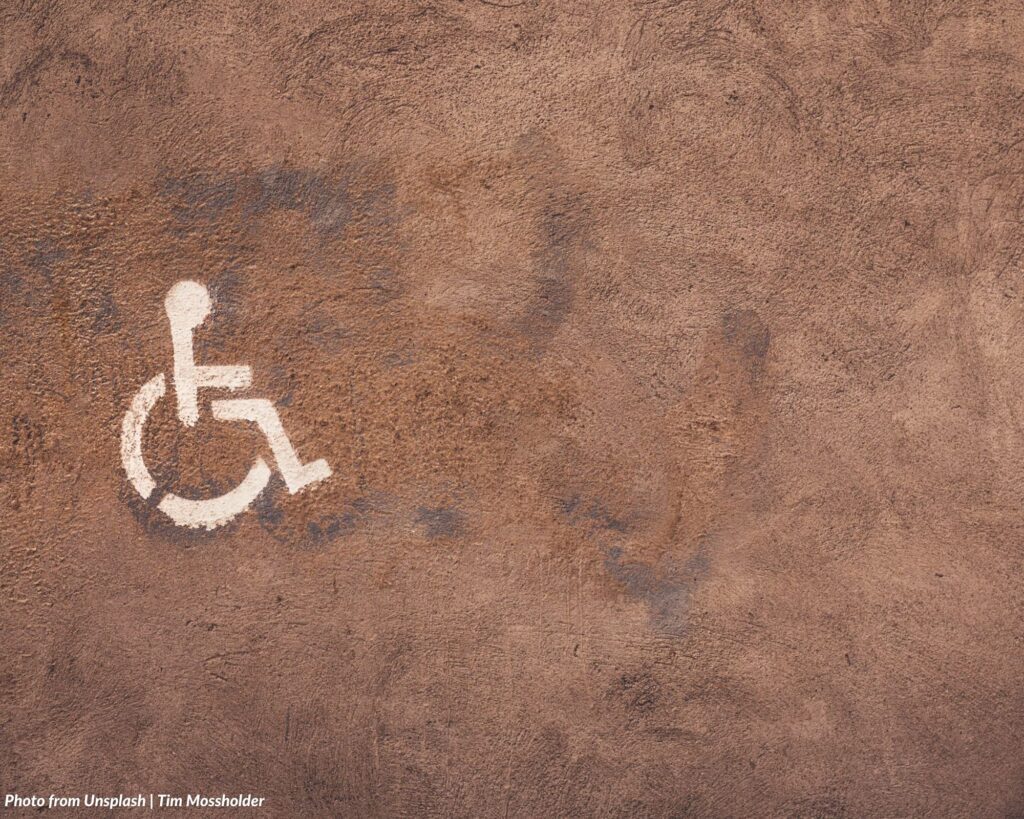
Photo from Unsplash | Tim Mossholder
The following post does not create a lawyer-client relationship between Alburo Alburo and Associates Law Offices (or any of its lawyers) and the reader. It is still best for you to engage the services of a lawyer or you may directly contact and consult Alburo Alburo and Associates Law Offices to address your specific legal concerns, if there is any.
Also, the matters contained in the following were written in accordance with the law, rules, and jurisprudence prevailing at the time of writing and posting, and do not include any future developments on the subject matter under discussion.
AT A GLANCE:
Persons with disabilities, as a member of the society, have the right to participate fully into the mainstream society. Towards this end, the persons with disabilities have the right to be given full support to the improvement of their well-being and their integration into the mainstream of the society. (Section 4, Rule II, Implementing Rules and Regulations of R.A. No. 9442)
Persons with disabilities (PWDs) have the same rights as other members of the society.
Republic Act No. 7277 or the Magna Carta for Disabled Persons declares the rights and privileges of persons with disabilities.
The law says:
“The grant of the rights and privileges for disabled persons shall be guided by the following principles:
(a) Disabled persons are part of the Philippine society; thus, the Senate shall give full support to the improvement of the total well-being of disabled persons and their integration into the mainstream of society.
Toward this end, the State shall adopt policies ensuring the rehabilitation, self-development and self-reliance of disabled persons.
It shall develop their skills and potentials to enable them to compete favorably for available opportunities.
(b) Disabled persons have the same rights as other people to take their proper place in society. They should be able to live freely and as independently as possible. This must be the concern of everyone, the family, community and all government and non-government organizations. Disabled person’s rights must never be perceived as welfare services by the Government.
(c) The rehabilitation of the disabled persons shall be the concern of the Government in order to foster their capability to attain a more meaningful, productive and satisfying life. To reach out to a greater number of disabled persons, the rehabilitation services and benefits shall be expanded beyond the traditional urban-based centers to community-based programs, that will ensure full participation of different sectors as supported by national and local government agencies.
(d) The State also recognizes the role of the private sector in promoting the welfare of disabled persons an shall encourage partnership in programs that address their needs and concerns.
(e) To facilitate integration of disabled persons into the mainstream of society, the State shall advocate for and encourage respect for disabled persons. The State shall exert all efforts to remove all social, cultural, economic, environmental and attitudinal barriers that are prejudicial to disabled persons.” (Section 2, R.A. No. 7277)
Persons with disabilities, as a member of the society, have the right to participate fully into the mainstream society. Towards this end, the persons with disabilities have the right to be given full support to the improvement of their well-being and their integration into the mainstream of the society. (Section 4, Rule II, Implementing Rules and Regulations of R.A. No. 9442)
The law says:
“It is the objective of Republic Act No. 9442 to provide persons with disability, the opportunity to participate fully into the mainstream of society by granting them at least twenty percent (20%) discount in all basic services. It is a declared policy of RA 7277 that persons with disability are part of Philippine society, and thus the State shall give full support to the improvement of their total well-being and their integration into the mainstream of society. They have the same rights as other people to take their proper place in society. They should be able to live freely and as independently as possible. This must be the concern of everyone the family, community and all government and non-government organizations. Rights of persons with disability must never be perceived as welfare services. Prohibitions on verbal, non-verbal ridicule and vilification against persons with disability shall always be observed at all times.”
Republic Act No. 9442 amended Republic Act No. 7227 or the Magna Carta for Disable Persons. It provided for other privileges and incentives for PWDs, as well as prohibitions on verbal, non-verbal ridicule and vilification against PWDs.
The law says:
“SEC. 39. Public Ridicule. – For purposes of this chapter, public ridicule shall be defined as an act of making fun or contemptuous imitating or making mockery of persons with disability whether in writing, or in words, or in action due to their impairment/s.
SEC. 40. No individual, group or community shall execute any of these acts of ridicule against persons with disability in any time and place which could intimidate or result in loss of self-esteem of the latter.
SEC 41. Vilification. – For purposes of this Chapter, vilification shall be defined as:
(a) The utterance of slanderous and abusive statements against a person with disability; and/or
(b) An activity in public which incites hatred towards, serious contempt for, or severe ridicule of persons with disability.”
SEC. 42. Any individual, group or community is hereby prohibited from vilifying any person with disability which could result into loss of self-esteem of the latter.” (Republic Act No. 9442)
Read also: International Day of Persons with Disabilities in the Philippines (Proclamation No. 1157, s. 2006)
Alburo Alburo and Associates Law Offices specializes in business law and labor law consulting. For inquiries regarding taxation and taxpayer’s remedies, you may reach us at info@alburolaw.com, or dial us at (02)7745-4391/0917-5772207.
All rights reserved.


